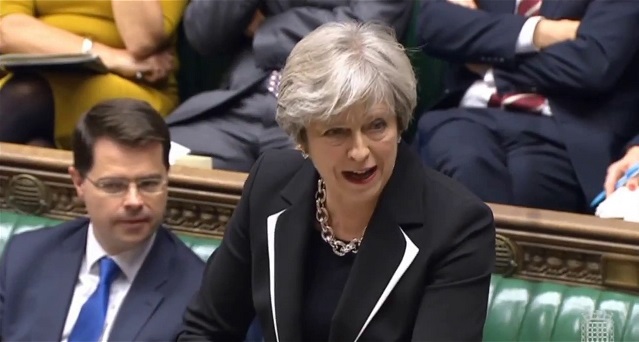
London, United Kingdom | AFP | British MPs on Friday rejected Prime Minister Theresa May’s EU divorce deal for a third time, opening the way for a long delay to Brexit — or a chaotic “no deal” withdrawal in two weeks.
The pound slipped as lawmakers defied May’s plea to end the deadlock that has plunged Britain into a deep political crisis, defeating her withdrawal agreement by 344 votes to 286.
Britain had been due to leave the EU on Friday, the long-heralded March 29 “Independence Day”, but with paralysis in parliament May asked European leaders last week for a little more time.
She now faces having to explain what happens next, after EU Council President Donald Tusk immediately called a Brussels summit for April 10.
The EU has set a deadline of April 12 for a decision, with two likely options: Britain leaves with no deal at all, or agrees a lengthy extension to allow time for a new approach.
The prime minister has said it would be “unacceptable” to ask voters to take part in European Parliament elections in May, three years after they voted in a 2016 referendum to leave the EU.
MPs have repeatedly rejected a “no-deal” outcome, fearing catastrophe if Britain severs ties with its closest trading partner with no plan in place.
However, this is still the default legal option, and the European Commission said after Friday’s vote that this remained the “likely scenario”.
This was echoed by the French presidency, which said London must “urgently present an alternative plan in the next few days”.
German Foreign Minister Heiko Maas added: “We are running out of time to prevent a disorderly Brexit.”
– Election talk –
Thousands of flag-waving protesters gathered outside parliament on Friday to accuse MPs of betraying Brexit, holding up signs saying “Give Our kingdom back” and “Free Britain now”.
Inside, May said she would keep pressing for an “orderly Brexit”, but added: “The implications of the house’s decision are grave.”
The prime minister had offered to quit if MPs backed the deal, but while some of her critics fell in behind her, 34 of the 314 MPs in her Conservative party still rebelled.
“I fear we are reaching the limits of this process in this house,” she said.
Her comments sparked speculation she might call an election as the only way to break the impasse, something opposition parties have called for.
But her spokesman said she did not believe this would be “in the interests of the country”.
May’s authority lies in tatters after weeks of turmoil, but officials have hinted she might yet try to bring the deal back to MPs for a fourth and final time.
Her spokesman noted the numbers against the deal were falling, from a majority of 230 in January, to 149 earlier this month and now 58, adding: “We are at least going in the right direction.”
– MPs can end this nightmare –
The failure by parliament to agree the terms of Brexit has left businesses unable to plan even a few weeks ahead.
“We are running out of words to express how sick business leaders are of being stuck in this spirit-sapping limbo,” said Edwin Morgan, interim chief of the Institute of Directors.
May has blamed MPs, but they say it is her refusal to change course that is blocking any solution.
“It is clear that this House does not support the deal… and if the prime minister can’t accept that, then she must go,” opposition Labour leader Jeremy Corbyn said.
Tired of waiting, MPs this week gave themselves unprecedented powers to vote on various options for Britain’s future relationship with the EU.
A proposal for a new customs union got close to passing in a first round, as did a plan for a referendum on May’s deal, with more voting planned next Monday and Wednesday.
“Only MPs can end this nightmare for businesses,” said Josh Hardie, of the CBI business lobby group.
The risk that MPs decide to agree closer ties to the EU, or even stop Brexit altogether, persuaded some proponents to reluctantly back May’s deal.
They included some of her staunchest critics such as former foreign minister Boris Johnson — a leading contender to replace her — and MP Jacob Rees-Mogg.
But May’s Northern Irish allies, the Democratic Unionist Party (DUP), still held out, saying planned arrangements to keep open the Irish border after Brexit remained unacceptable.
“We are not prepared to see our constitutional position altered by Brussels in a fit of pique for daring to leave the EU,” said MP Sammy Wilson, the DUP’s Brexit spokesman.
 The Independent Uganda: You get the Truth we Pay the Price
The Independent Uganda: You get the Truth we Pay the Price



